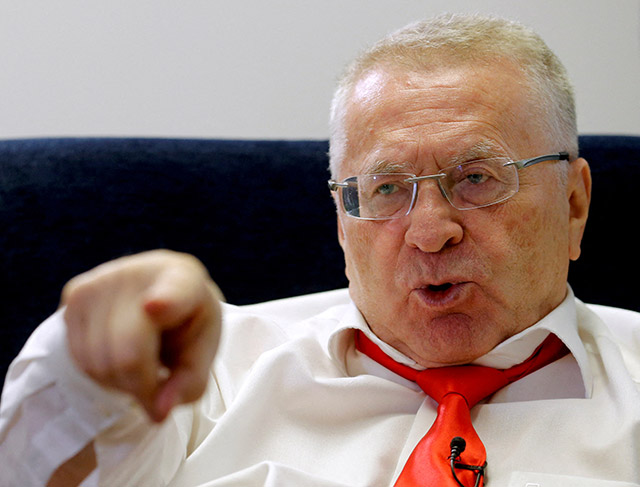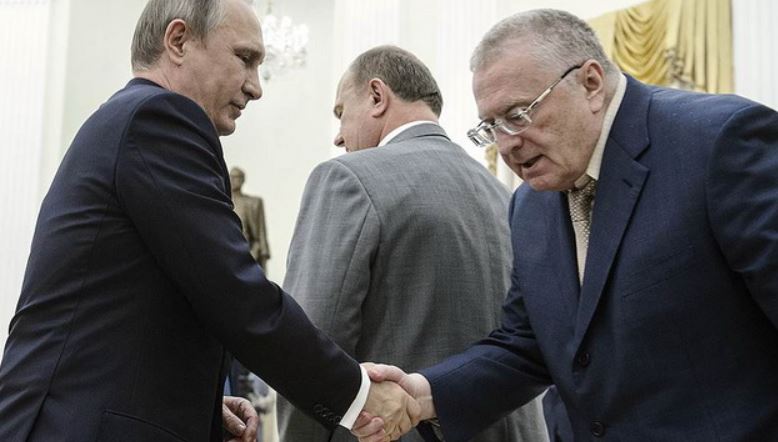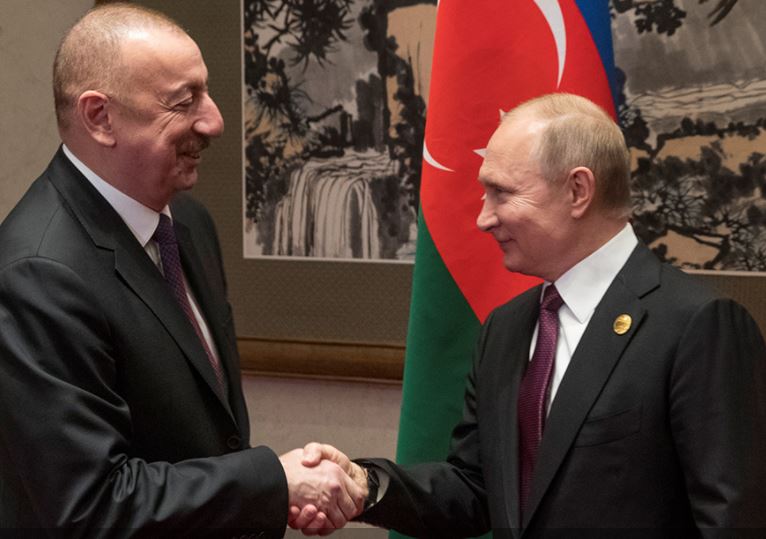Rferl.org. Vladimir Zhirinovsky, the rabid Russian nationalist lawmaker whose political rise in the early 1990s frightened the West and underscored the fragility of democracy in the immediate post-Soviet period, has died. He was 75.
Russian State Duma speaker Vyacheslav Volodin said Zhirinovsky died after a “long and serious illness.” Zhirinovsky had been in a Moscow hospital since early February after testing positive for COVID-19 and developing pneumonia.
Zhirinovsky had been one of the most visible and well-known figures in Russian politics over the past three decades, capturing domestic and international headlines with his xenophobic comments and outlandish public behavior, including fistfights in parliament and on television talk shows.
He had been a prominent fixture in the lower house of parliament, the State Duma, since his misleadingly named Liberal Democratic Party of Russia (LDPR) stormed to a strong result in 1993, capturing the most votes in the first legislative elections since the collapse of the Soviet Union two years earlier.
Read also
He ran for president five times after that, never receiving 10 percent of the vote. And while he frequently raised fears with his provocative pronouncements in his early years in the spotlight, he later struggled even to raise eyebrows, as Russians became accustomed to his remarks and his role in the ruling apparatus.
He appeared to have lost almost all of his real political influence years ago, serving instead as a colorfully controversial but ultimately predictable piece of the so-called “systemic opposition” to President Vladimir Putin, who uses this group to advance his goals and preserve a veneer of democracy and pluralism.
Zhirinovsky rose to prominence in the early 1990s by playing on widespread disillusionment among the Russian populace with the economic and political upheaval that set in before the Soviet collapse and deepened following the country’s demise in December 1991.
The rapid transition to a market economy under President Boris Yeltsin cast many Russians into poverty as factories shut down, inflation skyrocketed, and the communist-era social safety net, threadbare as it was, unraveled.
In the December 1993 parliamentary elections, many citizens expressed their opposition to both Yeltsin and the Communist Party by voting for Zhirinovsky, who offered little in the way of a practical solution to those problems.
Zhirinovsky’s platform called for lowering the price of vodka, “defending the rights” of ethnic Russians inside and outside the country, and incorporating former imperial lands.
He also threatened the use of nuclear weapons against former adversaries – just one of a growing number of aggressive, often over-the-top positions he took publicly — while blaming the West for many of the nation’s ills.
“Less a party than a backdrop to its demagogic leader Vladimir Zhirinovsky, the [LDPR] espoused ultranationalist positions, including anti-Western rhetoric; expanding Russia’s borders to include Poland and Finland, and eventually reaching the Indian Ocean; increasing arms sales abroad and restoring ties with traditional Soviet allies like Iraq and Libya; intensified support for Serbia; ridding Russia of non-Russians; provoking ethnic wars outside Russia; and warning Japan, Germany, and the United States of nuclear attack or blackmail,” the U.S. Commission on Security and Cooperation in Europe said in a January 1994 report analyzing the election.
The LDPR won nearly 23 percent of the party-list votes in the election, besting liberal opponents and raising fears among those Western officials who were hoping that democracy would swiftly take hold in Russia after centuries of autocratic rule.
Zhirinovsky’s strong showing in the election prompted some observers at the time to draw comparisons to Adolf Hitler, who had won over disgruntled voters with his virulent nationalism during a similar period of deep economic and political turmoil in Germany following its defeat in World War I.
“Widespread disillusionment had worked to Zhirinovsky’s advantage. After his election, I believed the nationalist leader could – though not necessarily would – become Russia’s Hitler,” Michael McFaul, an U.S. election observer at the time who would go on to become President Barack Obama’s ambassador to Russia from 2012-14, wrote in his book From Cold War To Hot Peace.
McFaul described Zhirinovsky as the “symbolic winner” of the election and said his popularity called into question the prevailing liberal view about “the superiority and inevitability of worldwide democracy.”
For a brief period of time, Zhirinovsky was considered to be a serious challenger to Yeltsin in the 1996 presidential election, Russia’s first since the Soviet collapse.
However, his political star quickly dimmed as his boorish behavior alienated voters.
In the December 1995 Duma elections, the LDPR received 11 percent in the party-list voting – half as many votes as the Communist Party. Six months later, Zhirinovsky came in fifth in the first round of the presidential election, with less than 6 percent of the vote.
Over the years, Zhirinovsky’s tirades and antics turned him into more of an entertainer than a politician in the eyes of Russian voters. To liberal opponents and the nation’s intelligentsia, he was little more than a clown.
His influence further waned with Putin’s political ascent at the end of the 1990s.
Over more than 22 years as president or prime minister, President Vladimir Putin has consolidated power in part by neutering the parliament and co-opting political forces that are nominally in the opposition.
The LDPR has rarely opposed the policies of Putin and the dominant, Kremlin-controlled United Russia party. Political observers say the Kremlin has sometimes used Zhirinovsky and his party to send up trial balloons on initiatives it does not want to immediately be associated with the government.
Like Zhirinovsky, Putin also attached importance to the issue of ethnic Russians who found themselves living outside the country after the fall of the Soviet Union.
“The difference was that, until 2014, Putin had always claimed that talk of ‘bringing back’ these lands with lots of Russians in the so-called ‘near abroad’ was not politically realistic,” said Brian Taylor, a professor of political science at Syracuse University who focuses on Russia.
Since 2014, when Putin sent the military to seize control of Crimea, the president’s rhetoric with respect to Russians and Russian speakers in Ukraine “has become more strident, which rhetorically moved him closer to Zhirinovsky, although usually without the extreme flourishes that Zhirinovsky was famous for,” Taylor said.
Zhirinovsky ran against Putin for president in 2000, 2012, and 2018, and against placeholder Dmitry Medvedev in 2008 – campaigns widely seen as part of Kremlin efforts to create the appearance of pluralism and competition. By contrast, opposition leader Aleksei Navalny was barred from the 2018 ballot over convictions on financial-crimes charges he say were fabricated to sideline him.
Zhirinovsky was born in what was then the Soviet republic of Kazakhstan on April 25, 1946, a year after the end of World War II, to a father with a Ukrainian Jewish background and an ethnic Russian mother.
Zhirinovsky initially denied his Jewish heritage and rarely talked about his father, Volf Eidelshtein, who moved to the newly formed state of Israel a few years after his son’s birth.
Zhirinovsky took the last name of his mother’s first husband when he turned 18.
He moved to the Soviet capital in the 1960s to attend Moscow State University, where he majored in Turkish studies, and he briefly worked in Turkey. He received a law degree in 1977 and a philosophy degree much later, in 1998, after defending a dissertation on “the past, present, and future of the Russian nation.”
In March 1990, Zhirinovsky was elected head of the Liberal Democratic Party of the Soviet Union, which he had helped create – reportedly with the backing of the KGB – a few months earlier. It was the first legal opposition party in the Soviet Union.
He ran for president of what was still the Soviet republic of Russia in June 1991, coming in third with 8 percent of the vote in an election won by Yeltsin.
The Soviet Union ceased to exist six months later and the political upheaval continued, with Yeltsin ordering the shelling of the parliament building in October 1993 during a showdown with anti-reform opponents that led to parliamentary election that December.
Zhirinovsky is survived by his wife, Galina Lebedeva, and three grown children.






















































